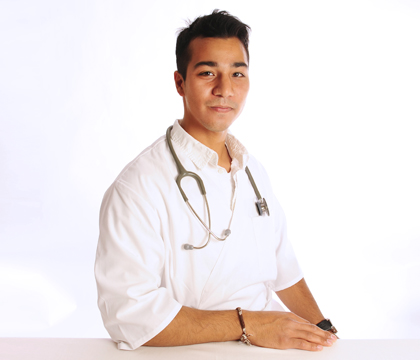
B.C. student hooked on aquatic vet medicine
While growing up on Canada's West Coast, Darius Khambatta of Vancouver, B.C., was fascinated with the local aquatic wildlife and with the wide variety of species found in the aquatic world.
By Lynne Gunville"I was always at the docks reeling up a fish in preparation for an amateur autopsy, or I'd be in the aquarium engaged in a one-on-one with the fish wafting back and forth," said Khambatta.
Although he entered university with plans for a career in molecular biotechnology, Khambatta's interests in transgenics as well as his obsession with aquatic species eventually shifted his focus to aquaculture and a career in aquatic veterinary medicine.
"It's a multi-faceted discipline that encompasses my interests in the aquaculture industry and in transgenic research. How can this impact food safety and security, animal health and welfare, trade and disease?" said Khambatta, who became a first-year student at the University of Saskatchewan's Western College of Veterinary Medicine in late August.
Khambatta and his classmates received an official welcome to the WCVM and to the veterinary profession on September 28, during a white coat ceremony in Saskatoon, Sask. All 80 first-year students received personalized white lab coats and stethoscopes from representatives of national and provincial veterinary medical associations during the evening ceremony.
The new students, who will graduate from the WCVM's four-year Doctor of Veterinary Medicine (DVM) program in 2016, come from communities across Western Canada and the northern territories. The regional veterinary college accepts 20 B.C.-based students each year.
Khambatta brings with him a diversity of experience that includes gaining exposure to small animal veterinary medicine by volunteering at the Animal Hospital of Manitoba. He also enjoyed the opportunity to volunteer as an intern at the Greater Vancouver Zoo where he worked with all the staff, including zoo veterinarian Dr. Bruce Burton.
"I learned something new each day," said Khambatta. "I worked with animals as big as the hippopotamus and as small as the poison dart frog, with adorable animals like rabbits and with fiercer looking ones like snakes, caimans, tigers, lions and bears – it was exhilarating."
As part of his undergraduate degree in molecular biotechnology at the University of Manitoba, Khambatta also completed an honours research project at Fisheries and Oceans Canada's Freshwater Institute in Winnipeg, Man.
That research, which focused on the detection and molecular characterization of koi herpes virus (KHV) in Manitoba, will undoubtedly prove to be valuable for Khambatta as he prepares for a career in aquatic veterinary medicine.
But for Khambatta, he gained his most significant experience during the summers he spent working in the commercial-catch fishing industry. He eventually hopes to be involved in developing government policy and legislation that facilitate a gradual transition into the commercial-culture industry.
"I believe that the aquaculture industry is tremendously undervalued, and this is what drives me today," said Khambatta. "It will be a pleasure to dig deep for advances in technology and research in order to realize the industry's potential to serve as a sustainable source of seafood."
